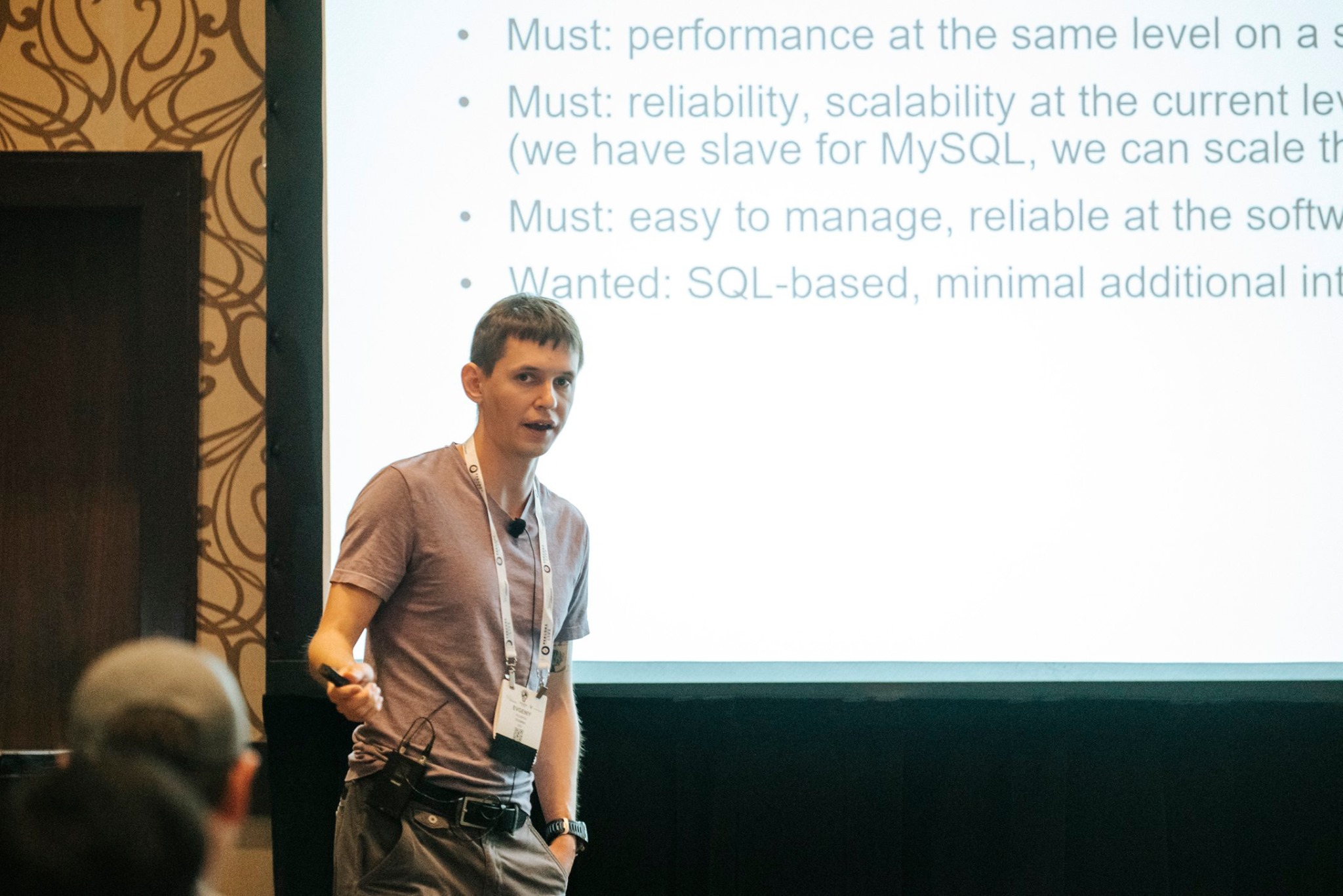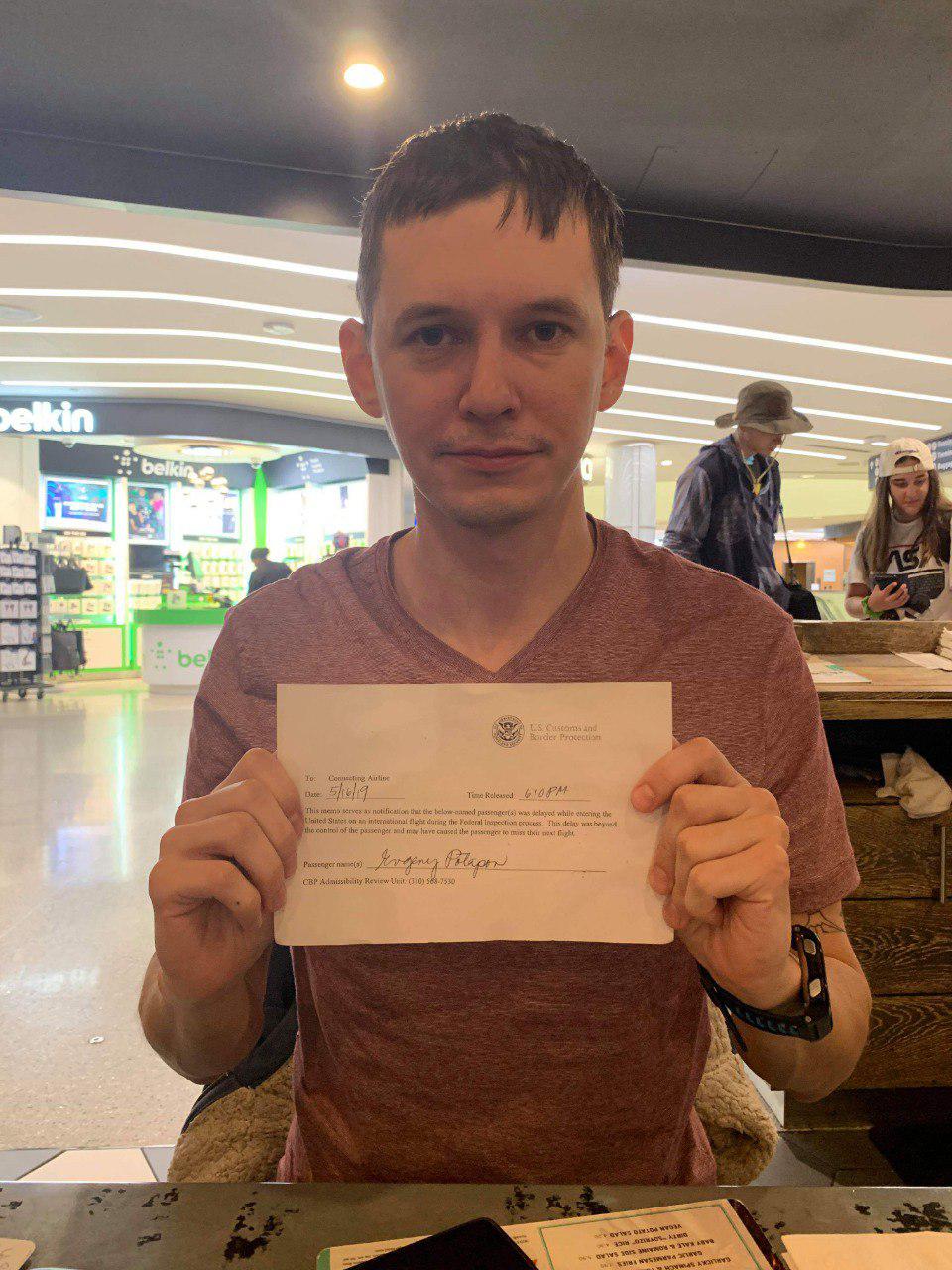How I became a Percona Live speaker (and some intriguing details from the American border)

Percona Live Open Source Database Conference is one of the main events on the calendar of the DBMS world. Once it all began with the development of one of the forks of MySQL, but then the progenitor greatly outgrew it. And although a lot of materials (and visitors) are still closely related to the MySQL theme, the general information background has become much wider: MongoDB, PostgreSQL, and other less popular DBMS. This year “Perkona” became a significant event on our calendar: for the first time we took part in this American conference. As you probably already know, we are very concerned about the state of monitoring technologies in the modern world . With the shift of infrastructure paradigms towards maximum flexibility, microservices and cluster solutions, the associated tools and approaches to support should also change. That, in fact, was my report. But first I want to tell you how they get to the state conferences and what surprises they can expect right after landing.
So how do people get to overseas conferences? In fact, this process is not so complicated: you need to contact the program committee, state your topic for the report, attach evidence that you already have experience speaking at technical events. Naturally, given the geography of the conference, an important point is language proficiency. Extremely desirable, including the experience of speaking to an English-speaking audience. All these issues are discussed with the program committee, they assess your potential, and either - or.
Legal issues, of course, have to decide on their own. By yourself, you understand what the reasons for obtaining visa documents in Russia is somewhat difficult. For example, in Moscow, waiting Visitor Visa at the time of this writing is 300 days. Residents of capitals, in general, are accustomed to bypass these complexities of paperwork in some neighboring countries. But since we are based in Irkutsk, the nearest neighboring state is Mongolia ... Stop. Ulan Bator! After all, there is also an American embassy there. And, frankly, not very popular and therefore not very busy. The journey from Irkutsk to Ulan Bator on an airplane takes one hour. The time zone does not change - you can continue to work in a convenient and familiar rhythm. From the entrance to the embassy before getting a visa takes literally half an hour. The only difficulty - to pay the consular fee can only be in cash MNT at the Khan Bank. Therefore, if you want to come immediately for a ready-made visa, then it would be nice to have someone from your friends there who can assist with the solution of this issue.
')
So. Visa received, seat in the plane saddled. Approaching entry into the States themselves. Crossing the border there has always been a tedious thing. When I first flew in 2010, I went nuts because of how long it took the passport control in Washington. No, of course, the queue to the cherished windows has always been a classic. But now some decent time (for several years for sure) added special machines that break through your information and give you a piece of paper with your photo - and everything became faster. All the last trips I flew with a round-trip ticket, with all the data on accommodation hammered into the ticket, etc. And this time I flew with a ticket there with a postponed date and without a return ticket associated with it. And voila: the photo on a white piece of paper was crossed out.
Officer approach
The queue was suddenly as long as a few years ago, and when an hour later I finally got to passport control, I got completely relaxed. The officer asked why I had come; I answered - business (sales, type of visa b1 / b2 it allows) and rest (vacation), to which he clarified what flight I flew in, and explained that I was not in the database flying. I really wanted to sleep and replied that I did not know why it was so ... maybe because I changed the dates of departure. An American official wondered why I changed my departure dates and when I fly back. To which I replied that I changed, because I decided to fly at another time, and when I fly back, I can only answer approximately. And then the officer said “okay”, raised his hand and called the other guy to whom he gave my passport. He led me to an additional check. To my reminder that I had a plane in an hour, he calmly replied, “don't worry, you are definitely late for it, it will last for several hours, you will be given paper to carry the tickets”.
Oh-kay. I went into the room: there are still about 40 people sitting there, from our flight it was the 3rd including me. He sat down, only got into the phone, the guard immediately ran up and told him to turn it off, and pointed to the walls: it turned out that everything around the signs “you can’t use phones” that I didn’t notice because of tiredness and lack of sleep. I turned off, but the neighbor did not have time - for those who do not have time, the phones are simply taken away. It took about three hours, from time to time someone called for extra. the interview, I was not called up as a result - they just gave me a passport with the stamp that I was allowed to go. What was it? (c) True, the ticket for the missed flight, in the end, really changed the received information.

Austin, Texas
And finally, under my feet, Texas land. Texas is a place name familiar to the Russian man, but still not the most visited place by his compatriots. I had been to work in California and New York before, but I did not have to climb this far to the south. And if it were not for Percona Live, it is still unknown when it would be necessary.

The city of Austin is something like a "California enclave" within the state of Texas. How did that happen? The initial basis for the rapid growth of the Valley, in addition to, of course, government investments, was a mild climate and low cost of living and running a business. But now that San Francisco and the districts have literally become a symbol of exorbitant high prices, new startups are looking for new places. And Texas was a good option. First, zero income tax. Secondly, zero gross income tax for individual entrepreneurs. A large number of universities - therefore, a developed market of skilled labor. Not very high, by American standards, the cost of living. All of this, in general, provides a good feed for the development of new technological enterprises. And - creates an audience for relevant events.

Percona Live itself was held at the Hayatt Regency Hotel. According to the currently popular scheme, the conference consisted of several parallel thematic threads: two for MySQL, one for Mongo and PostgreSQL, and a section on AI, security, and business. Unfortunately, it was not possible to fully evaluate the entire program, due to the tight preparation mode for our own performance. But those reports, which had a chance to look, were extremely entertaining. Separately, I would single out “The Changing Landscape of Open Source Databases” by Peter Zaitsev and “Too Much Data?” By Yves Trudeau. We met there with Alexey Milovidov - he also had a report and brought with him a whole team from Clickhouse, which I also touched on in my speech.

Allow me to report
And, actually, about the main thing: about what I told? The report was devoted to how we chose to ourselves for the new version of the monitoring system time-series database. Somehow it happened in our Palestinians that when the need arises for such a tool, it is customary to take Clickhouse by default. Why? "Because he is faster." And surely faster? How much? Maybe there are some other pros and cons that we don’t think about until we try something else? We decided on a hardcore approach to the study of issues; but simply taking and listing characteristics is boring and, frankly, not very well remembered. And people, as the wonderful p0b0rchy Roman Poborchy teaches, are much more interesting to hear some kind of story. Therefore, we talked about how we drove all the tested DBMS on our production data, which we receive in real time every second from our monitoring agents.

What are your impressions of the event?
Everything was organized perfectly, the reports are interesting. But what stood out most was the fact where the DBMS is now technologically moving. Many, for example, have not used self-hosted solutions for a long time. We have not gotten used to this so far and, accordingly, do not see anything unusual in the manual installation, tuning and support of the DBMS. And there the clouds have long ago enslaved everyone, and conditional RDS is the default option. Why bother with performance, security, backups, maintain individual technical specialists for this, if you can take a ready-made service, where everything is thought out for you in advance?
This is a very interesting and, perhaps, alarming bell for those who are not yet ready to provide their solutions in a similar format.
On the whole, this concerns not only the DBMS, but the entire server infrastructure. Administration is shifted from the Linux console to the web console, where you need to be able to choose the right services and cross them with each other, understand how specific cloud providers work with their EKS, ECS, GKE and other capital letters. In our country, in connection with our favorite personal data law, internal players in the hosting market have developed well, but so far we have lagged behind the leading edge of the global technological movement, and we will only have to experience similar paradigm changes.
And I will publish a detailed analysis of the report, but a little later: now it’s just being prepared - I translate from English to Russian :-)
Source: https://habr.com/ru/post/457026/
All Articles